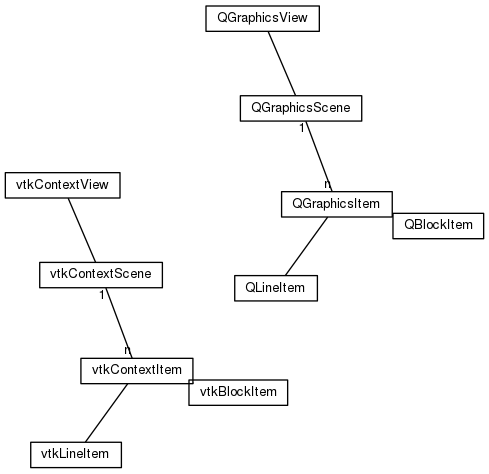VTK/CanvasAPI: Difference between revisions
(Added some details about function pointers.) |
|||
| Line 50: | Line 50: | ||
It seems that there is a wish to be able to declare functions that override certain aspects of rendering. In a traditional C++ API this would normally be accomplished by inheritance and overriding of a virtual function. The same thing can be accomplished by supplying function pointers without needing to derive a class. | It seems that there is a wish to be able to declare functions that override certain aspects of rendering. In a traditional C++ API this would normally be accomplished by inheritance and overriding of a virtual function. The same thing can be accomplished by supplying function pointers without needing to derive a class. | ||
The QtConcurrent API uses function pointers, and boost_bind optionally. Check out the relevant sections of their [http://doc.qt.nokia.com/4.5/qtconcurrentmap.html API documentation here] for more details. So a specific signature is required for the function pointer, but this could optionally be created by | The QtConcurrent API uses function pointers, and boost_bind optionally. Check out the relevant sections of their [http://doc.qt.nokia.com/4.5/qtconcurrentmap.html API documentation here] for more details. So a specific signature is required for the function pointer, but this could optionally be created by boost::bind (or possibly boost lambda functions). | ||
As an example the equivalent code would be. | As an example the equivalent code would be. | ||
Revision as of 18:52, 11 November 2009
After recent discussions I have been prototyping a simple canvas style API for VTK. The diagram below shows a rough equivalence to the QGraphicsView framework present in Qt, but with a much more basic API at this stage.

Using Function Pointers
It seems that there is a wish to be able to declare functions that override certain aspects of rendering. In a traditional C++ API this would normally be accomplished by inheritance and overriding of a virtual function. The same thing can be accomplished by supplying function pointers without needing to derive a class.
The QtConcurrent API uses function pointers, and boost_bind optionally. Check out the relevant sections of their API documentation here for more details. So a specific signature is required for the function pointer, but this could optionally be created by boost::bind (or possibly boost lambda functions).
As an example the equivalent code would be.
<source lang="cpp">#include <mymark.h>
double scalarFunction(int index);
int main() {
MyMark *mark = new MyMark; mark->SetScalarFunctor(scalarFunction);
}
double scalarFunction(int index) {
return index * 3.0 / (index - 1.0);
}</source>
Compared with a more traditional inherited class API.
<source lang="cpp">#include <mymark.h>
class InheritedMark : public MyMark { protected:
virtual double scalarFunction(int index);
};
int main() {
InheritedMark *mark = new InheritedMark;
}
double InheritedMark::scalarFunction(int index) {
return index * 3.0 / (index - 1.0);
}</source>